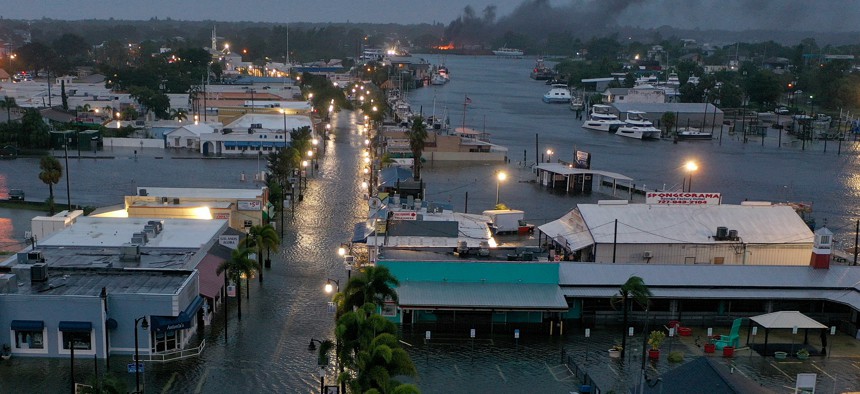Connecting state and local government leaders
The U.S. set a new record for billion-dollar climate disasters in 2023. State budgets are increasingly shouldering the costs of more frequent and expensive weather events.
This article is from a series about public finance issues that are likely to capture the attention of lawmakers this year. It was originally published by The Pew Charitable Trusts.
In 2023, U.S. states endured more weather-related disasters causing a billion dollars or more in damage than ever. The increasing cost and risk of natural disasters is playing a major role in shrinking the home insurance market and driving up rates in Gulf Coast and Western states. In response, leaders in these states have taken a range of steps to protect property and state budgets from the myriad threats posed by more frequent and costly disasters.
In Florida, a rapid loss of insurers and rising cost of policies has prompted regulatory changes designed to reduce the state’s budget exposure as the de facto home insurer, and Gov. Ron DeSantis proposed a fiscal 2025 budget that includes more than $500 million to cut taxes and other insurance costs for homeowners.
Similarly, in California, where seven of the largest 12 insurance groups paused or restricted new business last year, Insurance Commissioner Ricardo Lara announced a major overhaul of regulations. The new regime will relax restrictions on rate increases—almost certainly prompting widespread hikes for homeowners—while also mandating broader coverage in high-risk areas.
And in Louisiana, newly elected Commissioner of Insurance Tim Temple wants to make the state’s regulatory climate more friendly to insurers and reduce litigation. Like Florida, the Pelican State is rolling out an incentive program to encourage private companies to assume homeowner policies currently in the state-backed insurance program.
Local entities funded in part by states are also feeling the insurance squeeze. School districts throughout Louisiana, for example, are seeing dramatic cuts in coverage amid increasing costs. Ascension Parish, outside of Baton Rouge, now pays twice as much as it did five years ago for half as much property insurance coverage. Public housing authorities are also grappling with rising rates.
Additionally, states are dealing with increased volatility in their own spending on natural disaster response and recovery as the damage caused by extreme weather events becomes more costly. Although 46 states have a disaster spending account, most don't have a consistent strategy for funding it.
Recent years, however, have seen more policymakers pay attention to disaster funding practices in the interest of mitigating states’ fiscal risk.
In Massachusetts, one of the four states without such an account, lawmakers are proposing a new disaster relief fund. As noted in previous research from The Pew Charitable Trusts, California has authorized utility companies to issue bonds backed by ratepayer revenue to support disaster preparedness and recovery for critical infrastructure, and Nevada recently granted its forestry department access to a contingency fund that provides additional dollars for wildfire response.
Meanwhile, in the face of growing need and in response to federal policymakers' concerns about the Federal Emergency Management Agency’s fiscal exposure, states continue to increase their focus on funding mitigation, response and recovery. For example, South Carolina last year completed its first statewide resilience plan and supported it with $200 million in funding for implementation. California recently appropriated $2.7 billion over four years for wildfire resilience, and Louisiana officials have a $1.7 billion list of coastal restoration and hurricane risk reduction projects they hope to prioritize in the next fiscal year.
Liz Farmer, former author of the Public Finance Update newsletter, works on The Pew Charitable Trusts’ state fiscal policy project.

NEXT STORY: Ending health care’s affordability crisis begins with actions to fix state markets



